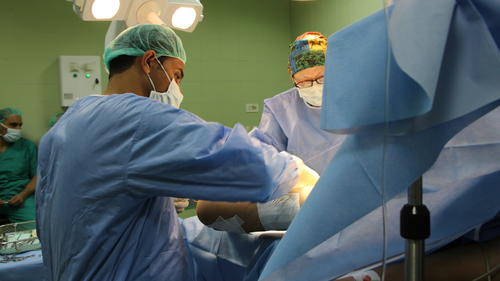
9,500
9,5
6,000
6,
400
4
West Bank
MSF has been running mental health programmes offering free and confidential support in Nablus, Qalqilya, Hebron, Bethlehem and Ramallah governorates, where the ongoing occupation and internal violence continue to have a serious impact on the physical and psychological health of the people. They are exposed to both direct and indirect trauma, including violence, raids on their homes and arrests of family members.
In November 2017, MSF concluded its mental health interventions in Bethlehem and Ramallah, but continued to run the programmes in Nablus, Qalqilya and Hebron governorates. Teams also continued to provide mental health awareness sessions in villages in Nablus and Qalqilya governorates. They extended the activity to five of the most affected areas in Hebron, where long-term mental health interventions are conducted, involving existing groups from the community.
These activities included psychoeducation on stress management, mental health stigma and awareness, and individual consultations for those in need.
In 2017, 644 patients benefited from individual and group mental health sessions. Over 44 per cent of these patients were under 18 years of age.
In 2017, MSF strengthened its partnership with Nablus Rafidia hospital, providing psychological support to patients admitted to the burns unit and the paediatric ward, and to their caretakers, and supervising medical staff.
Gaza Strip
A number of factors have contributed to the deterioration in the general socioeconomic situation in Gaza, including the 10-year blockade imposed by Israel and the fighting between the various Palestinian authorities. More than half of the population is unemployed, electricity is restricted to a few hours per day, there is a lack of clean drinking water and people’s movements in and out of the Strip are extremely limited, preventing them from seeking specialised healthcare.
MSF staff work in three clinics in Gaza, providing specialist care for burns and trauma patients, such as dressings, physiotherapy and occupational therapy. In 2017, 4,900 patients were treated, mostly for burns sustained in domestic accidents; 62 per cent of these patients were under 15 years old.
Despite the technical experience of MSF nurses and physiotherapists, their work is complicated by the limited access to essential painkillers in Gaza. To alleviate the suffering of burns patients during the most painful medical procedures, MSF introduced the sedation technique using nitrous oxide mixed with oxygen, known as EMONO.
MSF continued to run its reconstructive surgical programmes in conjunction with the Ministry of Health for patients with burns, trauma or congenital malformations. In 2017, MSF teams performed a total of 411 interventions on 197 patients, 75 per cent of whom were under 18 years of age.
The most complex cases that cannot be handled in Gaza are referred to MSF’s reconstructive surgery hospital in Jordan. However, due to administrative restrictions, only six out of 19 patients could be referred in 2017.
MSF continued to run sessions on burns awareness for schools and women’s associations, giving advice on preventing accidents and lessons in first aid.


















